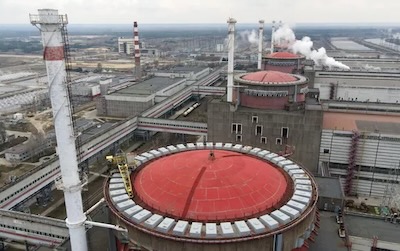
The three Baltic States – Estonia, Latvia and Lithuania – welcome this Security Council meeting to address the unprecedented nuclear risk caused by Russia’s military presence and its irresponsible actions in the Zaporizhzhia nuclear power plant.
As we are nearing the seventh month of Russia’s aggression against Ukraine, we reiterate our condemnation in the strongest possible terms of Russia’s deliberate and unprovoked war. Such an unjustified invasion of its peaceful neighbour has grossly violated international law, undermined global security and even shaken the foundations upon which the United Nations was built. Russia must be held accountable for its illegal actions.
At present, Russia’s military actions are threatening to create yet another – nuclear – disaster. The Zaporizhzhia nuclear power plant has been occupied by the Russian military since March. Since then, there have been constant reports of Russia’s military presence at and reckless military operations being carried out from the nuclear power plant, as well as reports of intimidation and abuse of its staff. Recently, even reports of shelling by the Russian forces in the Zaporizhzhia nuclear power plant have emerged.
It would be an understatement to say that the shelling and occupation of a nuclear power plant are unprecedented. Russia’s negligent approach to nuclear safety and militarization of civilian infrastructure thus demand a firm response.
As Rafael Grossi, Director General of the International Atomic Energy Agency (IAEA), has repeatedly stated throughout the tenth Review Conference of the Parties to the Treaty on the Non-Proliferation of Nuclear Weapons, virtually all seven indispensable nuclear safety and security pillars have been breached in the Zaporizhzhia power plant since the invasion. Previously, IAEA raised similar concerns over Russia’s military operations around Chernobyl.
Russia has repeatedly alleged that the incidents at the Zaporizhzhia nuclear power plant occur because the Ukrainians are not allowing Russia to maintain the plant properly. Let us be clear, Russia was neither requested nor invited to take care of the Zaporizhzhia power plant – it was illegally occupied and militarized by Russia. Ukraine is well equipped and competent to operate its own power plants. It is the Russian forces who prevent Ukraine from fulfilling its nuclear and radiation safety obligations in accordance with international conventions and IAEA safety standards.
We demand that Russia immediately cease its military actions, withdraw its troops from the entire territory of Ukraine and allow the competent Ukrainian authorities to regain control over their nuclear facilities and infrastructure. We also encourage the United Nations and IAEA to take an active role in assisting Ukraine to ensure the safe and secure operations of the nuclear facilities.
It is vital to further stress the need for an IAEA-led international mission at the Zaporizhzhia nuclear power plant. However, above all, such a mission should strictly comply with the national legislation of Ukraine and fully respect its international obligations.
Russia’s aggression against Ukraine’s civilian infrastructure and militarization of its nuclear facilities point to the urgent need for the international community to develop legally binding rules and ensure that no other country ever uses nuclear facilities in warfare again.
In conclusion, let us be reminded that nuclear disasters and the spread of radiation do not have borders – a nuclear catastrophe in Zaporizhzhia would affect the rest of Europe just as much as it would affect Ukraine for decades to come.
We must act now.
















Stay In Touch
Follow us on social networks
Subscribe to weekly newsletter